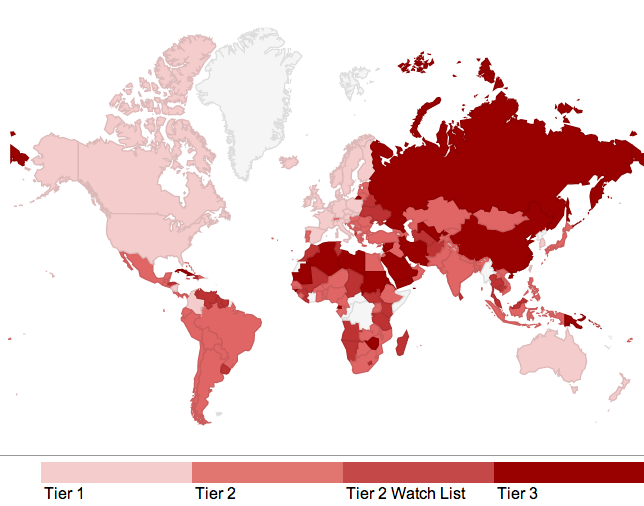In The Atlantic, Olga Khazan talks about the countries that appear on this US State Department map of human trafficking:

China, Russia, and Uzbekistan have been named among the worst offenders when it comes to human trafficking, according to a State Department report released Wednesday, joining Iran, North Korea, Cuba, Sudan, and Zimbabwe on the bottom “tier” of the U.S. human trafficking rank.
Their lower designation means the U.S. may sanction those countries with measures like cancelling non-humanitarian and military assistance, ending exchange visits for government officials, and voting against any IMF or World Bank loans.
China, Russia, and Uzbekistan had previously been on the “Tier 2 Watch List,” a middling designation for countries that show little progress in making strides in preventing forced labor. Because they had been on the “Watch List” for four years, the State Department was obligated to either promote or downgrade them.
In China, the one-child policy and a cultural preference for male children perpetuates the trafficking of brides and prostitutes.
“During the year, Chinese sex trafficking victims were reported on all of the inhabited continents,” the report found. “Traffickers recruited girls and young women, often from rural areas of China, using a combination of fraudulent job offers, imposition of large travel fees, and threats of physical or financial harm, to obtain and maintain their service in prostitution.”
However, the State Department also singled out the country’s epidemic of forced labor, in which both internal and external migrants are conscripted to work in coal mines or factories without pay, as well as its continued use of re-education hard labor camps for political dissidents.
However, it’s also worth keeping in mind that there are two common definitions of human trafficking in use, one of which is an outrage to common decency while the other is an attempt to conflate sex work with slavery:
1) The transport of unwilling people (usually women, but of course can at times be either men or children) into forced prostitution. This is of course illegal everywhere: it’s repeated rape just as a very start. It is also vile and we should indeed be doing everything possible to stamp it out.
2) The illegal movement of willing people across borders to enter the sex trade. Strange as it may seem there really are people who desire to be prostitutes. People would, other things being equal, similarly like to be in a country where they get a lot of money for their trade rather than very little. Given these two we wouldn’t be surprised if people from poorer countries, who wish to be in the sex trade, will move from those poorer countries to richer countries. And such is the system of immigration laws that many of them will be unable to do this legally: just as with so many who wish to enter other trades and professions in the rich world. You can make your own mind up about the morality of this but it is obviously entirely different from definition 1).



